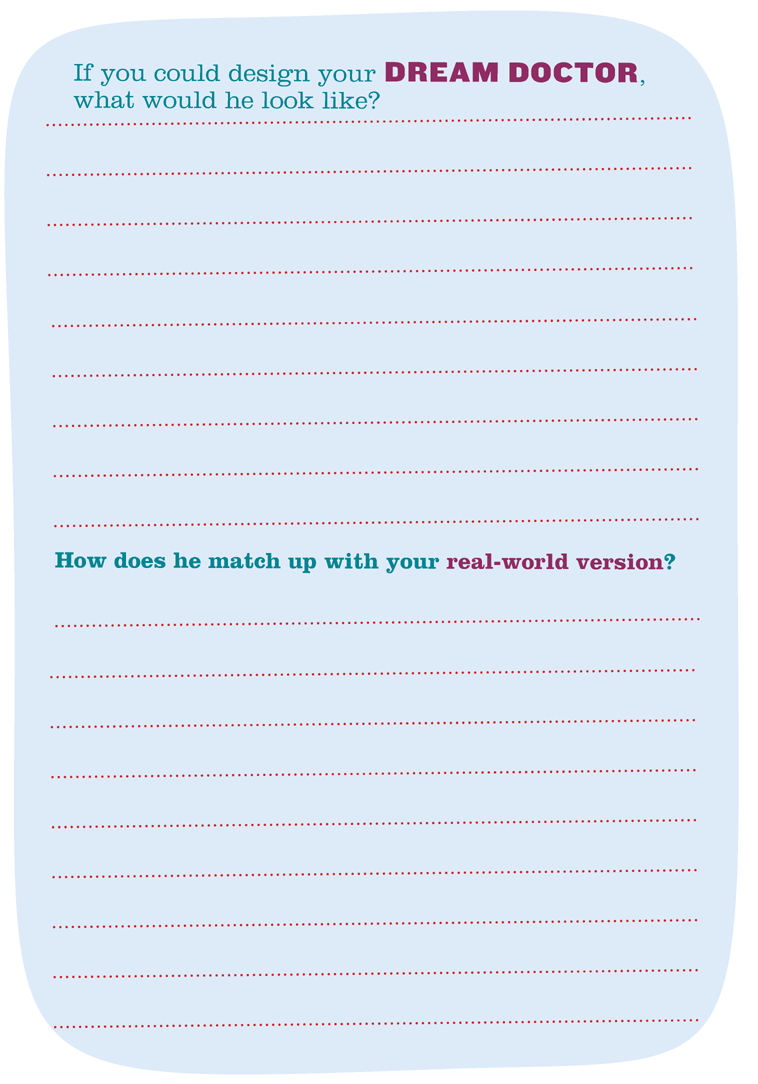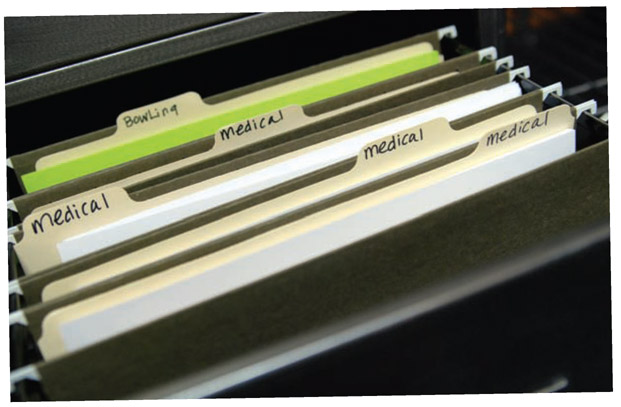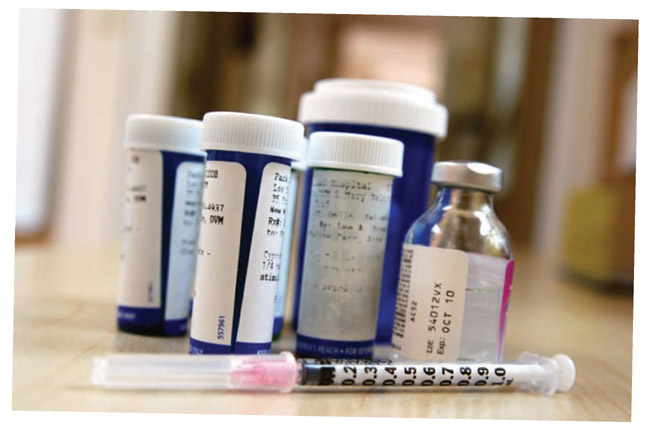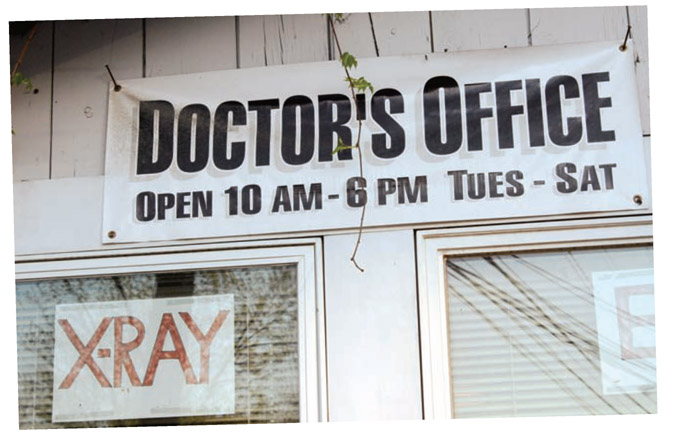

While juggling your already busy life, you’ve suddenly been catapulted into the “biohazardous” world of cancer. Critical decisions await, and I encourage you to find the strength to spearhead your strategy. You and you alone are responsible for your health. You are the boss, the CEO. You are in charge, and no one knows more about your body than you do! The key to success is to handpick a staff of winners to work by your side. Doctors, nurses, healers, alternative health practitioners, family, friends, and helpers are all vital members of your workforce.
WHEN YOU HIRE A DOCTOR, IMAGINE THAT THERE’S A JOB OPEN AT YOUR COMPANY.
If the applicant isn’t a perfect match, “No hard feelings and thanks for your time but I need someone more qualified.” Remember, she works for you! Don’t try to jam a square peg into a round hole. Move on, and when I say move I mean travel. Do not be lazy or go limp. If the doctor you choose doesn’t have her finger on the pulse of the latest research, then get in the car and go. You don’t owe anyone anything!
Open yourself up to the precious people you’ll meet along the cancer trail. A tall glass of bubbly came bouncing my way in my new friend Beth. We met after a lecture I gave in New York City, and my life has been blessed ever since. Beth shoots from the hip and has a heart as big as the Grand Canyon. She is a doctor and a CanSer Cowgirl, so she stands on both sides of the white coat. Her presence on my blog (http://crazysexycancer.blogspot.com—join us!) is so big that we nicknamed her Crazy Sexy Beth MD and welcome her regular contribution of tough love, sound advice, and sparkles. Here’s Beth’s remarkable story . . .
Thanksgiving Day, 2005. I didn’t go to my parents’ house for dinner, I was sick, had been all week. As a medical resident, it wasn’t unusual to pick up whatever virus was floating around the hospital, so I didn’t think too much of it. However, by day’s end, I had been admitted to the hospital with suspected meningitis. By week’s end, after a “visit” from the Code Team, I landed in the intensive care unit. What the heck was going on? This clearly wasn’t meningitis. I had no clue, but based on how tight my sphincter felt, I knew it was an oh shit! situation.
I spent the next two months in that hospital. Lots of tests, all repeated several times, indicated a problem. But everything about my case was so “unusual,” “atypical,” that no one could quite put the pieces together. Based on blood tests, my providers thought I had a tumor. I lost track of how many imaging studies I had; truth be told, most of that time was a blur. Long story short, they were unable to locate the tumor.
Things started to turn ugly. No picture of the tumor . . . so it must not exist, right? Many of my care providers—people I know and work with—began to doubt there was anything wrong with me (other than my head). Some stopped returning the nurse’s pages. I was yelled at to get out of the hospital. (Yet I couldn’t sit up in bed for very long without passing out. Forget about standing up.) The accusations started to fly. I must be doing something to make myself sick. I must be secretly snorting cocaine in my hospital room. I must be faking the lab data in the computer somehow. Right?
Wrong! But what do you do when, as a patient, your health care team not only stops taking care of you, but effectively abandons you? More than once I was put in the position of having to treat myself when my vital signs were at dangerous limits. When you are in that hospital bed, you are really at the mercy of your team. Nothing happens unless they make it happen. Otherwise you continue to just sit there. The pressure to discharge me was getting ugly. And I was terrified at the thought of what would happen to me if they did.
I knew there was something terribly wrong. I knew I was not getting the comprehensive care I required. Luckily, I also knew how to navigate the health care system. I got on the phone, called mentors, colleagues, friends. I got the name and number of a doctor in a nearby state, and I insisted I be moved to a Boston hospital under his care. For once, in the face of so many naysayers, I stood up and advocated for myself, my care, my health. And it is likely the only reason I am alive today. Turns out, I had a plum-size tumor in my heart. Needless to say, I wasn’t faking it. One more month in that Boston hospital, and I came out one mammajammer (that’s my friends’ name for the tumor) lighter.
I have lots of mixed emotions about that initial part of my canSer trail ride. But the key for all you other CanSer Cowgirls and dudes is to trust yourself. Speak up for what you know to be true. Don’t let your doctors make you doubt yourself, your own body, your instincts. And if they’ve stopped listening, find someone who will. It might just save your life, too.
It’s time to TAKE YOUR DOCTOR’S PULSE.
How’s your relationship going?




You have an incredible amount of power in the relationship between you and your physician. For some reason, people get in front of a white coat and throw their own instincts, knowledge, and decision-making capabilities out the window. Hell, I’ve done it, too, and I have a white coat of my own! So what can you do to empower yourself to make this relationship successful?
First and foremost, this is a relationship—ideally a partnership—that like any other relationship will have aspects that work seamlessly, and others that need a bit of cultivating. Doctors are not the enemy. Contrary to popular opinion, they are not responsible for the state of our health care system. That problem is way more complex than simply blaming the providers. So let’s see what we can do in our half of the relationship to make it work.
Do unto your doctor . . . Enter into your relationship with your doctor with a positive, embracing attitude—not one of anger, defensiveness, or mistrust. Hostility is a bad note on which to start any relationship. This can be hard, especially if you’ve had bad experiences. But just like every man isn’t that horrible boyfriend who cheated on you, every doctor is not the bad guy who came before. If his actions merit a smackdown—well, that’s another story. But don’t assume this from the get-go. Project the attitude with which you want to be treated. Okay, maybe a little golden-rulish, but ain’t it the truth? Start the relationship off with the right attitude, with a clean slate, moving forward, not looking back.
Set priorities. Define for yourself, when selecting a doctor, what your priorities are. Do you need/want a doctor who is going to have all kinds of charm? Or is it more important to you that she be immersed in the study, research, and treatment of your disease? Personally, I am willing to sacrifice some of the charm for a doc whom I know can go commando on my cancer, because she knows it from every angle. I can get the warm fuzzies from friends, family, social workers, shrinks, and so on. But that’s me. Lots of other people need to feel a connection with their care provider to develop that working relationship. Which is completely understandable. There is no right or wrong way here, folks. Just be clear on what you need from the dynamic.
Clarify your expectations—then communicate them to your doctor. Do you expect your physician to personally call you with results? Within what time frame do you want to hear something? Do you expect your doctor to be available weekends? Holidays? If not, how are those times covered? If you are hospitalized, do you expect your doctor to come in to see you that day? Much of this has to do with the workings of the health care system, but not understanding these things up front leads to a lot of patients getting upset. Sit down in a quiet space with pen and paper and make a list of every conceivable question, scenario, or problem you could have. You might be surprised that a big list will break down to be a few core procedural questions. Then discuss these with your doctor.
Be picky. You are not stuck with the first doctor you see. If the vibe between you two is just not happening, or if he’s too far toward the Attilathe-Hun extreme with his bedside manner, go see someone else! Kris said it oh so clearly: You employ him, not the other way around. Do not be afraid to say, “Thank you, but no thank you.” In my opinion (and yes, I am probably biased), your doctor is really your right-hand person in your canSer challenge. This needs to be someone you can work with long-term. Don’t sweat the bumps in the road; you may have an off interaction once or twice, as in any relationship. Keep it in perspective. Select your doctor just as carefully as you would select a mate, because this is a “life partnership” as well . . . your life.
Be prepared. Before your visit, write down a list of questions, in order of importance to you. Be reasonable about the length of your list. Your doctor is operating under time constraints that are not self-imposed (hello, insurance companies). He’d love nothing more than to go over everything with you, but he can’t always do that in one visit. Depending on the complexity of your questions, it is reasonable to expect your top five to get answered that day. If you have some still on the list, discuss with your doc how these will get addressed. Can you come back for a fifteen-minute appointment the following week? Can he review them later and e-mail you the responses? Can a nurse or physician’s assistant field some of the questions? You can also hang on to them and bring them to the next appointment. Your provider may be able to get to all of them. But if he can’t, it doesn’t mean he doesn’t want to or isn’t interested. Work with him, and I guarantee he’ll not only answer all your questions but often go above and beyond in getting information to you.
Be prompt. Don’t you hate having to wait for the doctor if she’s running late? I know I do. So please, hold up your end of the bargain . . . be on time for your visit! And that doesn’t mean showing up at the precise moment of your appointment. It means showing up fifteen minutes beforehand to check in, get any paperwork or insurance info updated or completed, get your vital signs taken, complete blood work, and so on. Doctors—again thanks to good ol’ Mr. Insurance—have appointments scheduled back-to-back from the minute they get there until the end of the day, often with few or no breaks. If you, as an early-morning appointment, are even ten minutes late, that throws off the whole day (because many appointments are scheduled in fifteen-minute intervals). Toss in the inevitable emergency and the schedule goes, well, you know where. Believe me, your doctor dislikes running late just as much as you do, if not more. Do your part to keep the day moving; don’t be late for your very important date!
Boundaries. Set your boundaries with your doctor at visit number one. Who is your provider allowed to give information to? How do you want to be contacted—e-mail, phone? Do you want a message left? Discuss the specifics of a possible hospitalization. Who will be caring for you? A resident service? One of your physician’s partners? Hospitalists? Are you okay with all that? Do you know from the get-go that there are treatments or interventions you don’t want? Set your boundaries. This helps your doctor, so don’t feel shy, demanding, or any other negative thing. Believe it or not, most doctors really just want to take the best care of you possible. But they need to know what that means for you, ’cause everyone is different.

Paperwork. Have your Living Will, advance directives, and health care proxy paperwork completed, signed, and notarized if needed. Everyone, big, small, healthy, or otherwise should have this paperwork done. It’s standard practice for providers to ask patients about this paperwork when they are admitted, regardless of their diagnosis. It is not a suggestion that you are dying, or even heading in that direction. It is simply asking you to make sure your wishes are clear so that, God forbid, if the poop ever hits the fan for any reason, things are being handled as you would want them to be. Discuss this with your family. If they are not on board with your choices, they can sometimes be a kink in the process (in other words, change your plans). So communicate, when things are calm and quiet.
I learned this one the hard way . . . I didn’t have all this paperwork done myself. I know, mea culpa, mea culpa. But then, there I was in the hospital, being told I might not make it off that operating table, and I was scrambling to get my affairs in order. Not a good time to do this. It is an emotional, upsetting, exhausting enough time without also having to try to find the clarity to make decisions about end-of-life care. You may find yourself choosing things you otherwise wouldn’t if the situation weren’t so emotionally charged. So do it now, when you are stable, when you can be clear about your wishes. If you don’t understand what terms such as being resuscitated, DNR, and DNI (do not intubate) mean, ask. You can’t make informed decisions if you don’t understand what each entails. Again, involve your family; you want everyone on the same page.
Be honest about what meds you are taking, what other treatments you might be utilizing, and your lifestyle choices. Doctors don’t ask these questions to be judge and jury; they just can’t be as effective without all the information. This may seem like a ridiculous tip—a no-brainer, right? Well, you might be surprised to learn that most patients underreport. Include any over-the-counter meds you are taking as well as herbal supplements and vitamins. Everything you put in your body interacts together, and you don’t want to find yourself in a toxic overdose situation because of medicine interactions. Your doctor can’t guide you if she doesn’t know. So put your cards on the table. If she poohpoohs some of your alternative medicine choices, that’s fine. You keep on your path. When your provider starts to see how well you do because you are availing yourself of these other treatment modalities, then slowly but surely they will be accepted into mainstream practice. In my lifetime alone, I have seen chiropractic care, osteopathic manipulative medicine, acupuncture, and massage go from being dismissed to being covered by insurance and widely available for inpatients! Medicine is in large part a consumer-driven market. So put it out there with your physicians. The results will speak for themselves.

Inform yourself about your disease. This does not mean you need to go back to school to get a medical degree. It does mean that you should be aware of what’s happening in your body. Often, this understanding will help tap into your own inner guidance about steps to take toward healing. The Internet is a wealth of information. But use caution: Facts taken out of context can paint a very misleading picture. There is nothing “cookie cutter” or, for that matter, black and white about medicine. How could there be? The human body is a living, breathing thing. I think a more efficient way might be to ask your doctor for some printed material about your diagnosis. If you want more information than that, ask. Because another concern about the Internet is that the source of the information there isn’t always clear. It could be distributed by industry (biotech companies, pharmaceutical companies, even insurance companies), and such info is not always unbiased. Your physician will most likely provide you data from the medical literature, which he has evaluated for validity. The Internet is great for getting the basics of your diagnosis under your belt, but for greater detail ask your doc.

Nurses are your friends. They’re hidden gems. Get the name, number, and e-mail of your physician’s nurse. She is your new BFF. Not only is she a font of information, but she is your inside track to the Big Cheese, your doctor. She manages, and manipulates when necessary, the doc’s schedule. She can get info to him, with a fairly quick response. Oncology nurses see it all, and they know what all the patients are doing for treatment, traditional or otherwise. They are walking libraries of information. Ask them everything and anything. I’m willing to bet they will know the answer. Nurses are huge resources—use them!
Advocate for yourself. This is not to be confused with being obstinate or obnoxious. It does mean you should stand up for yourself when the situation warrants it. Doctors do not have all the answers—a good one will be the first to admit that. Much of medicine is educated guesswork. But if in your heart of hearts you just know something isn’t right, push. And then push harder. In the end, even if we had a perfect health care system, the only person who can ensure your care is you. That’s a lot of responsibility. Many don’t take it. I encourage you, as overwhelming as it seems, to take it. It will empower you, free you, yes, even in some ways heal you, if you do.